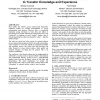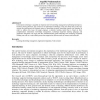126 search results - page 10 / 26 » Learning How to Manage Risks Using Organizational Knowledge |
ECTEL
2010
Springer
15 years 1 months ago
2010
Springer
As Technology Enhanced Learning (TEL) systems become more essential to education there is an increasing need for their creators to reduce risk and to design for success. We argue t...
108
click to vote
HICSS
2007
IEEE
15 years 8 months ago
2007
IEEE
Interorganizational knowledge sharing is critical to knowledge intensive collaborations between organizations. Despite a proliferation of literature on knowledge sharing, most stu...
106
click to vote
SIGSOFT
2001
ACM
16 years 2 months ago
2001
ACM
Most quality and software process improvement frameworks emphasize written (i.e. formal) documentation to convey recommended work practices. However, there is considerable skeptic...
ETS
2002
IEEE
15 years 1 months ago
2002
IEEE
Information technology is arguably an important tool for knowledge management, facilitating learning in a business context. However, the current use of information technology in t...
BPM
2009
Springer
15 years 8 months ago
2009
Springer
Abstract. Information security risk management (ISRM) heavily depends on realistic impact values representing the resources’ importance in the overall organizational context. Alt...


